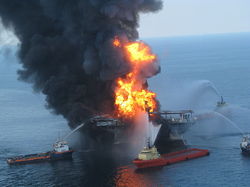Oil spill commission's missing document adds insight to Gulf investigation
 By Ryan Knutson, ProPublica
By Ryan Knutson, ProPublicaA new document uncovered last week might help to clear up some confusion over comments made by the President's Oil Spill Commission earlier this month when its chief counsel, Fred Bartlit Jr., said, "To date we have not seen a single instance where a human being made a conscious decision to favor dollars over safety."
Bartlit's comments made a big splash because they appeared to indicate that the commission was exonerating BP of the allegation that it cut corners on safety in favor of saving money -- seeming to fly in the face of what the press and other investigatory bodies had lately uncovered. Even the Wall Street Journal blogged that Bartlit "all but acquitted BP of the gravest charge."
Bartlit and the commission later backtracked, saying the media reached "overarching conclusions" about his presentation, but that wasn't enough to prevent a group of 60 scientists from publicly challenging the statement.
A new document, however, shows that the commission has in fact been considering harsher conclusions. The report, obtained by Greenwire, highlights 11 potentially time-saving (and ultimately cost-saving) decisions made by BP, Transocean and Halliburton that increased the overall risk of the operation.
The document was mistakenly posted to the commission's website last month and quickly taken down, which has led to claims that the commission might be trying to stifle the cost-cutting claim within its own ranks.
But the commission says that's not the case and that the document actually does align with the commission's findings, which are more critical of the companies than has been reported. The only reason the document was removed was that it hadn't yet been viewed by all seven members of the panel, commission spokesman Dave Cohen told ProPublica.
"We stand behind the document 100 percent," he said, adding that it will likely be presented formally at the commission's meetings this week. Cohen said Bartlit felt "extremely misunderstood" after his earlier comments and that he was only trying to avoid blaming the 11 workers who died on the Deepwater Horizon.
"He was trying to be extremely respectful to the men who lost their lives and the fact that they could not speak for themselves," Cohen said. "And in his view, everything he saw was that they were doing their jobs well, and it wasn't their fault."
Here's more of Bartlit's statement (you can view an archive video here), which he made as part of a two-day presentation on Nov. 8 and 9.
"It won't surprise you to learn that the out-of-pocket, all-in cost to somebody like BP of running one of these rigs is about $1.5 million a day, and of course if you're taking four or five days running drill strings up and down to do work, that's a cost. Now I'm going to say something now, I'll say it again at the end: To date, we have not seen a single instance, where a human being made a conscious decision to favor dollars over safety. I'll talk more about that later but it's important you keep that in your mind as we go. There's been a lot said about it. ... We have not found a situation where we could say a man had a choice between safety and dollars and put his money on dollars, we haven't seen it. And if anybody has anything like that, we of course welcome it."
The point was also highlighted in the panel's preliminary findings: "No evidence at this time to suggest that there was a conscious decision to sacrifice safety concerns to save money," reads the preliminary report.
The new document, though, explicitly lists decisions -- such as "not waiting for more centralizers" -- as risky, unnecessary and less time consuming.
Bartlit, 78, has been criticized by environmental groups because his firm, Bartlit Beck Herman Palenchar & Scott, has represented Halliburton in past litigation. He also represented George W. Bush in Florida in the 2000 election dispute versus Al Gore.
Cohen defended Bartlit, noting that even though the panel lacks subpoena power, Bartlit was able to persuade Halliburton to provide documents showing the company knew the cement used in the Macondo well had problems. Bartlit has other experience in offshore investigations; he played a major role in the investigation of the 1989 Piper Alpha disaster in the North Sea, where 167 people were killed.
Cohen insists the panel is not trying to exonerate any of the companies involved in the Deepwater Horizon disaster.
"We only ask that people judge us by the final report that is due out January 11," Cohen said. "The fact of the matter is that this commission has serious doubts about some of the decisions made by all three of the companies that were involved in the Macondo well."
(Photo of Deepwater Horizon fire by the U.S. Coast Guard.)
Tags
ProPublica
ProPublica is an independent, nonprofit newsroom that produces investigative journalism in the public interest.
